MRA Brain Screening Specialist in Culver City Los Angeles, CA
A proactive approach to health and better results all around are made possible by MRAs, which offer an unparalleled chance for the early detection of a variety of brain abnormalities or illnesses. An MRA can disclose minute data about blood vessel health and function, assisting in the early detection of potentially fatal disorders. MRA brain screening specialists, Dr. Kourosh Naini and our team of experienced professionals are available at the iVIE MRI Screening Clinic. For more information, contact us or book an appointment online. We are located at 11600 Washington Pl Suite 104A, Culver City, CA 90066.
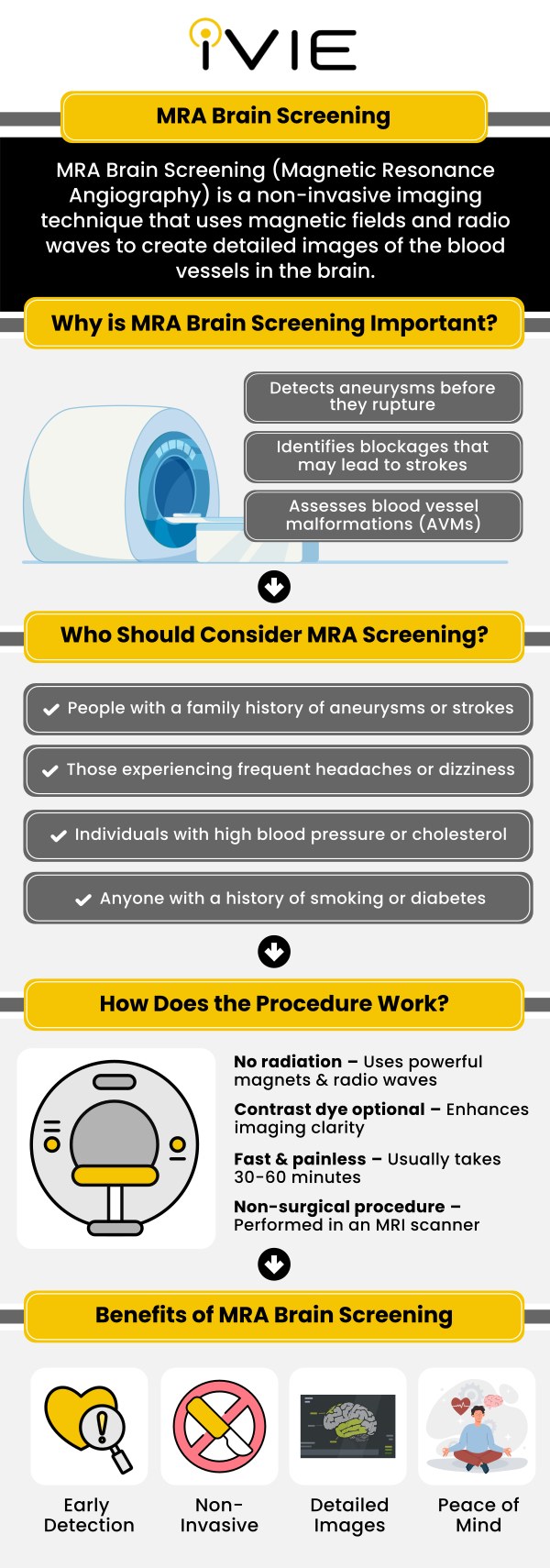
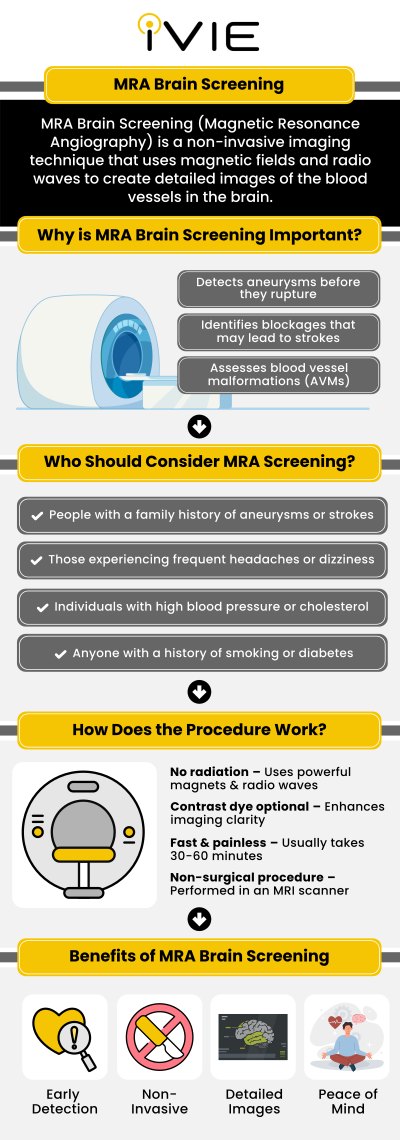
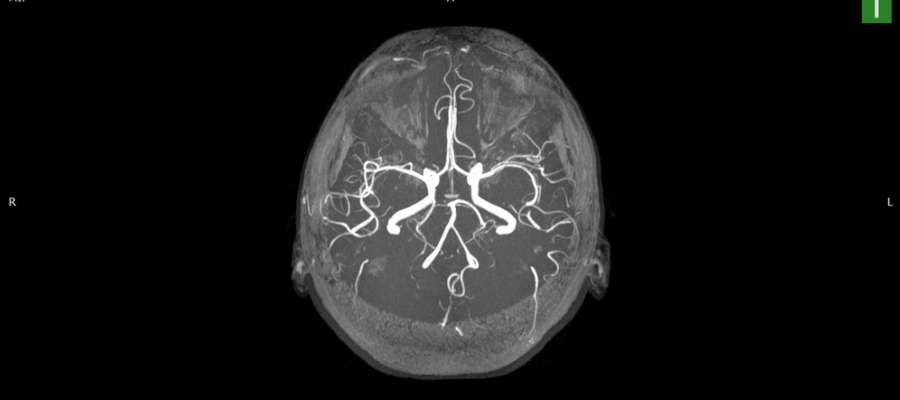
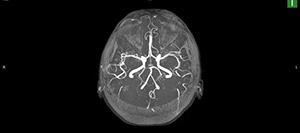
Table of Contents:
What does an MRA test for?
How long does an MRA brain scan take?
What is the difference between MRA and MRI?
What can a MRA tell us about the brain?
Magnetic Resonance Angiography (MRA) is a diagnostic tool primarily used to visualize and evaluate blood vessels in various parts of the body, including the brain, heart, pelvis, abdomen, and limbs. This type of imaging is crucial for identifying abnormalities such as aneurysms, blockages, and a host of other vascular malformations.
MRA employs a powerful magnetic field and radio frequency waves, in conjunction with a computer, to generate detailed images of blood vessels. This method is a less invasive alternative to traditional angiograms, which typically involve inserting a catheter into the body. MRA’s ability to visualize blood flow and vessel structure makes it an invaluable tool in the diagnosis and management of vascular diseases.
MRA is a non-invasive, detailed, and effective method for examining blood vessels. It plays a vital role in diagnosing, evaluating, and managing various vascular conditions in the brain and other body parts. The technology behind MRA, while similar to MRI, offers a more focused look at vascular health, making it a versatile and effective tool in medical diagnostics.
When it comes to how long an MRA brain scan takes, it will vary among patients depending on several factors. Typically, it ranges from 30 to 60 minutes. However, the time can extend depending on the complexity of the examination, the specific area being scanned, and whether contrast material is used. In some cases, where extensive imaging is required, the scan may take longer.
The specialists at iVIE MRI Screening Clinic will talk each individual through what to expect when it comes to the duration of their MRA brain scan. During the procedure, patients lie on a movable table that slides into the MRI machine, a large tunnel-like tube. The use of contrast material, administered intravenously, may be required to enhance the visibility of blood vessels, potentially lengthening the procedure.
While MRA and MRI are both noninvasive imaging techniques utilizing a magnetic field and radio waves to create detailed internal body images, they serve different purposes. MRI (Magnetic Resonance Imaging) is a broader diagnostic tool used for viewing organs, tissues, and skeletal structures.
It provides detailed images of soft tissues, bones, and internal body structures. MRA (Magnetic Resonance Angiography), a subtype of MRI, is specifically designed to image blood vessels. MRA focuses more on arteries and veins, providing crucial information about the blood flow and the condition of the blood vessels. MRAs often involve the use of a contrast agent to clearly identify blood vessels against surrounding tissues, which is less common in standard MRI procedures.
An MRA of the brain is particularly effective in diagnosing and evaluating various conditions. It can detect abnormalities such as aneurysms, which are weakened areas in the walls of arteries that pose a risk of rupture. MRA is also instrumental in diagnosing strokes, typically caused by blockages or bleeding in the brain.
Additionally, it can identify conditions like renal artery stenosis, where plaque buildup in arteries leads to the kidneys. By providing detailed images of the cerebral arteries and veins, MRA helps in assessing the risk of stroke, monitoring the progression of vascular diseases, and guiding treatment decisions.
An MRA can reveal the intricate details of blood vessel health and function, aiding in the early diagnosis of potentially life-threatening conditions. It can highlight areas of irregular blood flow, detect narrowing or enlargement of arteries, and help assess the aftermath of stroke or head trauma.
MRA of the brain can be particularly useful in planning surgical or interventional procedures in patients with known or suspected vascular disorders. MRA’s provide a valuable opportunity for the early detection of a host of brain conditions or irregularities, which facilitates a proactive approach to health and improved outcomes across the board.
MBA brain screening specialists are available at the iVIE MRI Screening Clinic. For more information, contact us or book an appointment online. We are located at 11600 Washington Pl Suite 104A, Culver City, CA 90066. We serve patients from Culver City Los Angeles CA, Downtown LA, Beverly Hills CA, Marina del Rey CA, Venice CA, Santa Monica CA, and surrounding areas.
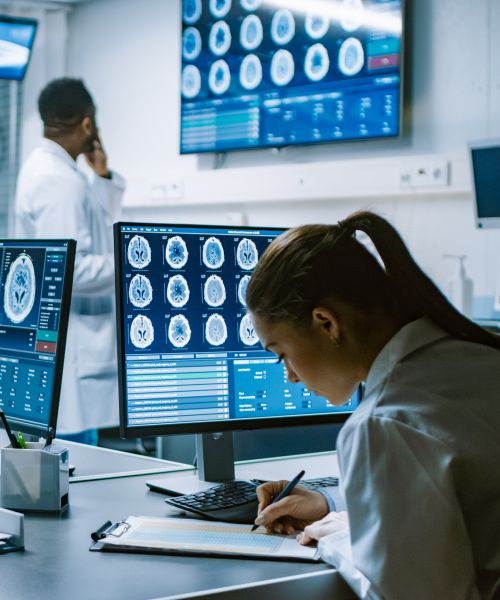
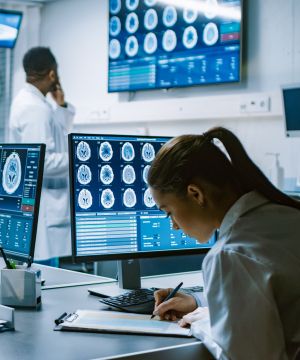
Additional Services You May Need
▸ Dementia Screening
▸ Aneurysm Screening
▸ Spine MRI
▸ Whole Body MRI Screening
▸ MRI Brain Screening
▸ Brain PET
▸ Work/Sport Spine Injury Diagnosis
▸ Work/Sport Brain Injury Diagnosis
▸ Whole Body PET For Cancer
▸ MRA Brain Screening


